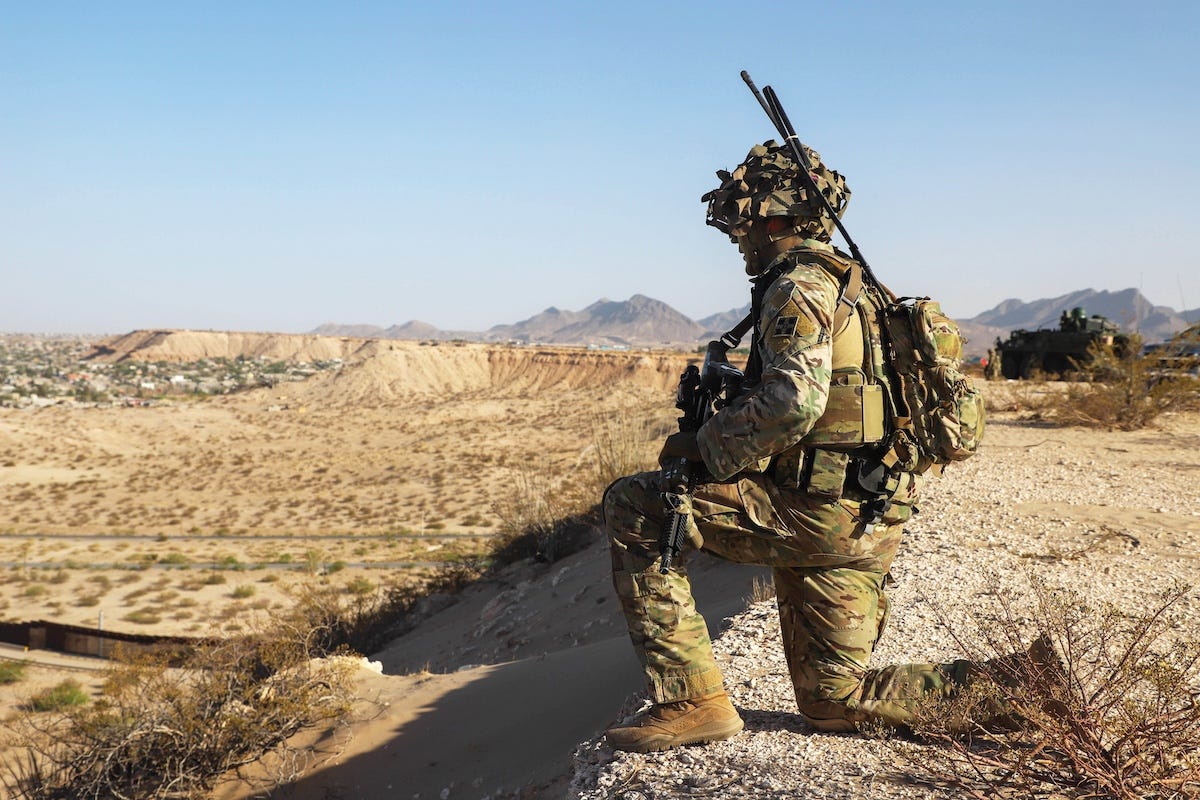🛑🇺🇸 Pentagon Expands Border Military Buffer Zones with New Areas in Arizona and Texas
🤝🇭🇳 Honduras and U.S. Forge Immigration, Security Deal Amid Trump Administration Tensions 🎉💌 How a Green Card Transformed a McAllen Family’s Future: Roberto’s Long Journey to Residency

🛑🇺🇸 Pentagon Expands Border Military Buffer Zones with New Areas in Arizona and Texas
Luis Martinez, ABC News.- The Pentagon has announced the establishment of two additional military buffer zones along the U.S.-Mexico border, increasing the number of "National Defense Areas" to four. These zones, located in Texas and Arizona, allow U.S. military personnel to temporarily detain undocumented migrants for trespassing until they are transferred to U.S. Customs and Border Protection. The Texas zone, covering 250 miles along the Rio Grande River, will be integrated into Joint Base San Antonio, while the Arizona zone, extending 100 miles, will be attached to Marine Corps Air Station Yuma. These areas aim to enhance border security through detection, monitoring, and the installation of barriers, although military personnel are not responsible for law enforcement duties. This expansion follows a federal judge's dismissal of trespassing charges against 98 individuals arrested in a previous National Defense Area in New Mexico.
Key Data:
Two new military buffer zones have been established in Texas and Arizona.
Military personnel temporarily detain trespassers until they are transferred to law enforcement.
The Texas zone covers 250 miles along the Rio Grande, and the Arizona zone extends 100 miles.
Previously established buffer zones include Texas (63 miles) and New Mexico (170 miles).
Pentagon’s Joint Task Force-Southern Border is responsible for enhanced detection, monitoring, and installation of barriers.
A federal judge dismissed trespassing charges for 98 arrested migrants in New Mexico’s National Defense Area.🤝🇭🇳 Honduras and U.S. Forge Immigration, Security Deal Amid Trump Administration Tensions
Rebecca Santana, AP.- In a historic meeting, Honduran President Xiomara Castro and U.S. Homeland Security Secretary Kristi Noem addressed mutual concerns over immigration and border security. The two governments signed an agreement to share biometric data of migrants transiting Honduras, a move similar to agreements made with other countries in the region. They also discussed migrants seeking protection in Honduras. Despite previous tensions between Castro’s administration and the U.S. due to disagreements over extradition and immigration policies under the Trump administration, the meeting signals a shift towards renewed cooperation. Castro had previously opposed mass deportations, but both sides now look to improve coordination on issues related to migration and drug trafficking. While the details of the agreements remain unclear, the discussions mark a significant step in U.S.-Honduran relations.
Key Data:
Honduras and the U.S. sign agreements on biometric data sharing and migrant protection.
The meeting follows tensions due to prior Honduran opposition to U.S. deportation policies.
U.S. plans to expand cooperation on migration security and drug trafficking.
Castro's administration had previously ended an extradition treaty, which was later reinstated.
The U.S. continues to push for migration control measures under the Trump administration.🎉💌 How a Green Card Transformed a McAllen Family’s Future: Roberto’s Long Journey to Residency
Erika De Los Reyes, The Monitor.- Roberto Velez, a DACA recipient, and his wife, Marisol, recently shared a heartfelt moment on TikTok when Roberto received his green card on Father’s Day, a significant milestone after years of uncertainty. The emotional video of Roberto’s reaction has garnered millions of views, capturing the joy of finally achieving permanent residency. Roberto’s journey began in 2000 when his family moved to the U.S. and, despite challenges such as not having a Social Security number and being ineligible for legal work, he pursued higher education and worked hard to support his family. After receiving DACA status, Roberto was able to build a successful career. Now, with his green card, he and his family look forward to traveling and experiencing new opportunities, including visiting Mexico together for the first time.
Key Data:
Roberto Velez’s long journey to a green card after DACA approval.
Emotional TikTok video goes viral with 2.5 million views.
The family’s aspirations for travel and new opportunities after receiving a green card.
Marisol Velez shares her pride in her husband's achievements.
Impact of DACA and permanent residency on the Velez family’s future.





